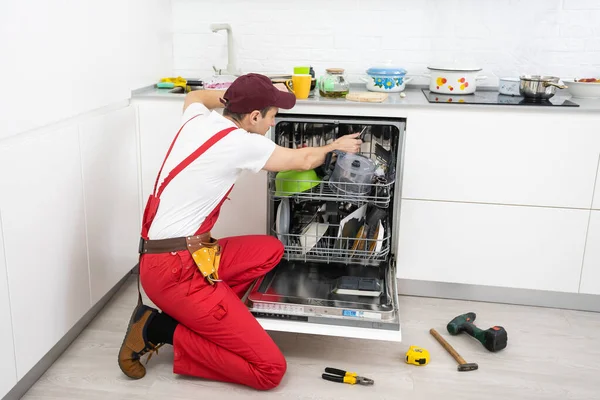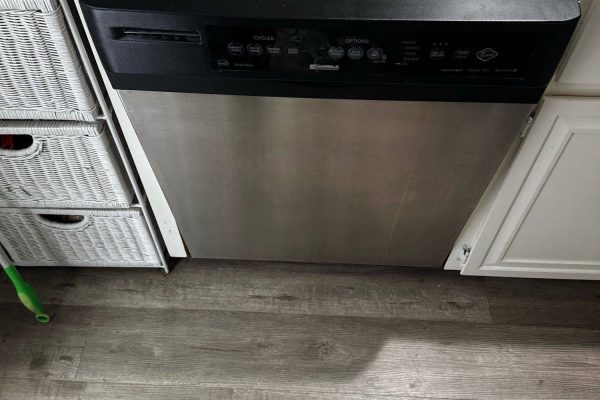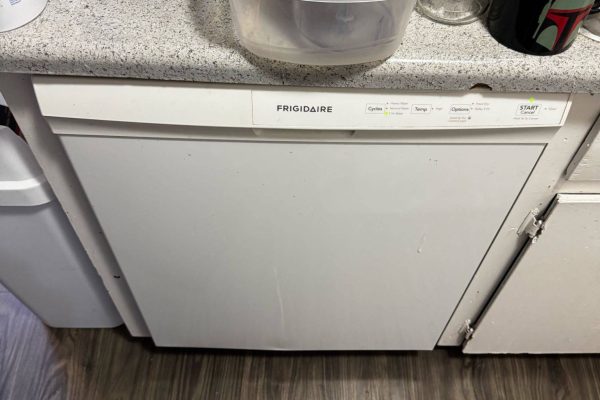If your Bosch dishwasher doesn’t dry or doesn’t dry well, and your dishes are still wet at the end of the wash cycle, it could be the result of several things.
But first, we advise you to check the simplest thing – perhaps you selected a wash program without drying. If not, here are some reasons why the dishes may stay wet after the dishwasher is finished.
1. The dishes are not loaded correctly
To improve the drying process in your dishwasher, make sure your dishes are loaded correctly. This means that to improve drying, the dishes should be placed so that there is enough space between the items to distribute the heat proportionally. Either the dishes were overturned during the washing process, so there is water left in them. It is advisable to place the dishes so that the water can flow off them freely.
Follow these 8 tips to load the dishwasher correctly:
Top basket
1. a safe place for cups, glasses, and small bowls. Make sure you leave enough space between items. This is very important because otherwise the dishes can get damaged or leave grease stains on them. Tall champagne and wine glasses should be placed on the bottom basket in the special glass holder.
2. Place plastic items that can be washed in a dishwasher in the upper basket so that they are not exposed to high temperatures.
Lower basket
3 Larger items such as plates, salad bowls, and pans are better placed in the lower basket where there is more space. You can even add trays, grill racks, or refrigerator shelves.
4. There is no need to pre-rinse the dishes before loading the appliance, as this is provided by a special rinse program. Nevertheless, it is necessary to clean the dishes of large food residues before loading them into the machine, as they may cause clogging of the dishwasher filter.
5. Serving plates and cutting boards should be placed on the side. This is because large objects can block the spray arms and obstruct the flow of water. Wooden cutting boards can be washed in the dishwasher, but we still recommend washing them by hand to avoid chipping.
6. Fixing for cleaning. You can secure baby bottles and other small plastic items such as lids and cups so they stay in place while the machine is running.
Cutlery
7. Place knives with the sharp blade facing down. This will help avoid injuries when unloading the dishwasher and will also prevent direct contact of bacteria with the knife.
8. Shuffle cutlery if your dishwasher does not have a pull-out cutlery container. The forks and spoons in the cutlery basket should be agitated to keep water out of the way and to prevent water from accumulating. If your dishwasher is equipped with a cutlery drawer, then you should place the same items next to each other to save space.
2. Dishes are made of plastic.
Plastic doesn’t dry well in the dishwasher because this material doesn’t retain heat. If your dishwasher has the innovative PerfectDry feature, turn it on and your appliance will dry plastic dishes as well as clean them.
3. Drying isn’t efficient enough
Another common reason why dishes and cutlery don’t dry well in the dishwasher is insufficient rinsing. We recommend using a rinse aid to improve the drying performance. It helps remove water from the surface of the dishes so that they dry faster. And if the rinse aid is not added or is added in insufficient quantity, the drying in the dishwasher is incomplete. Please check the amount of rinse aid added and increase the rinse aid dosage if necessary; also check the correct settings according to the operating instructions for your appliance. Please read the manufacturer’s instructions for more information on how to dose the product efficiently, as the amount of rinse aid used affects drying results.
You will get optimal drying results with rinse aid, even if it is included in your detergent. This is because rinse aid is added at certain times during the cycle, while capsules and tablets act differently.
To speed up the drying process, you can also choose a more intensive drying program depending on the model of your dishwasher. Please refer to the user manual for more information.
4. Limescale has formed in the appliance
Another reason why the “dishwasher” does not dry dishes, can be a malfunction associated with the heating element – it can be a failure of the flow heater (fan), temperature sensor, or control module. In this case, the dishes remain wet after washing, because the heating element simply ceased to perform its function.
As the repair practice shows, in the vast majority of cases, the dishwasher heater fails due to a large amount of limescale. Bosch recommends descaling the dishwasher regularly, every few months, using a proven Bosch branded descaler. To rule out the possibility of your dishwasher heater breakage, please give us a call. We are confident in the quality of work of our craftsmen. Here’s why. We don’t hesitate to offer a warranty on most of our work. This allows our customers to rest assured that they are getting the best service possible.
We have appliance repair experts available today! Call a professional Poway Appliance Service Center technician by phone or through an online request.
Our service center is open 24/7, so you can easily schedule a convenient repair time. The specialist will arrive at the agreed time, carry out a diagnosis, and, if necessary, offer repairs. If you are willing, your appliance will be repaired directly on-site within 1-2 hours. We provide top-notch service at an affordable price!
Contact us
(858) 203-0990
[email protected]


